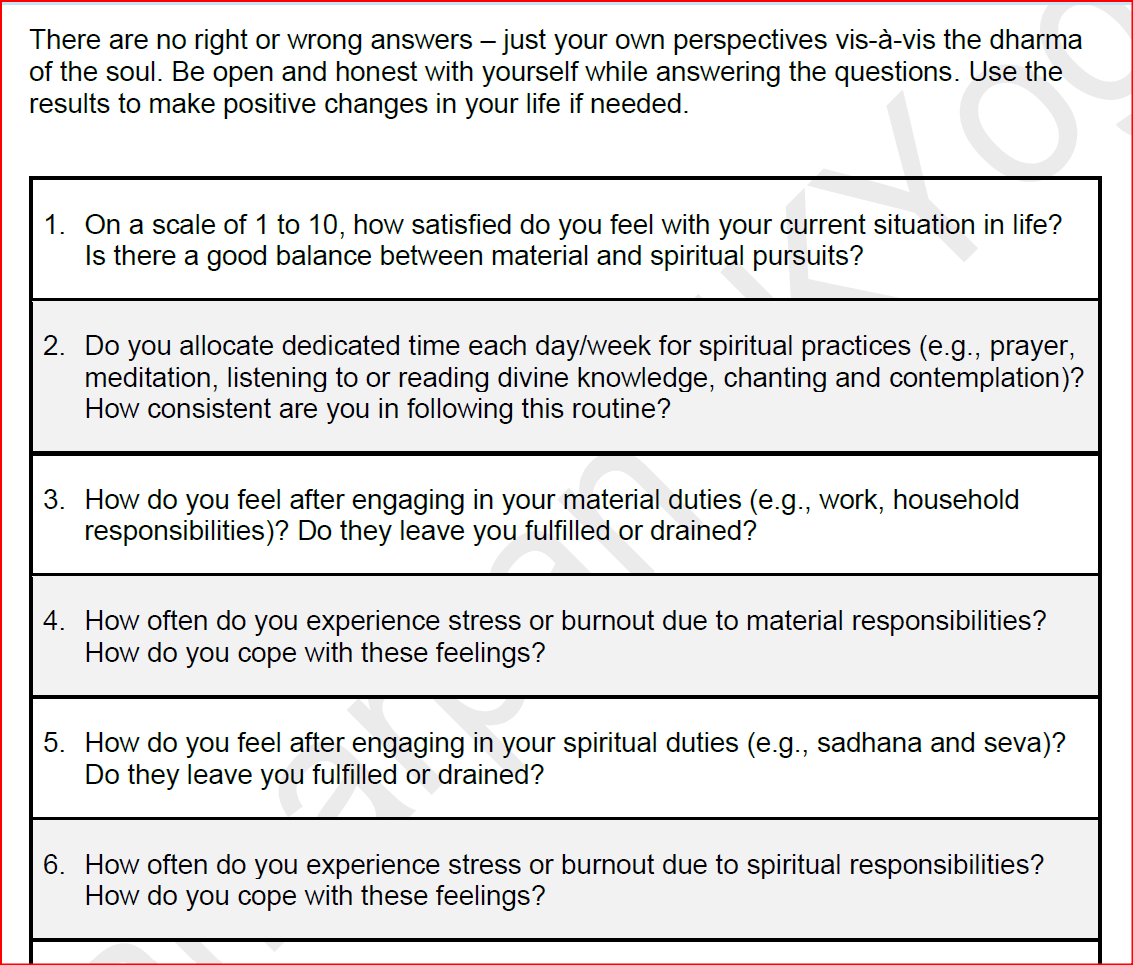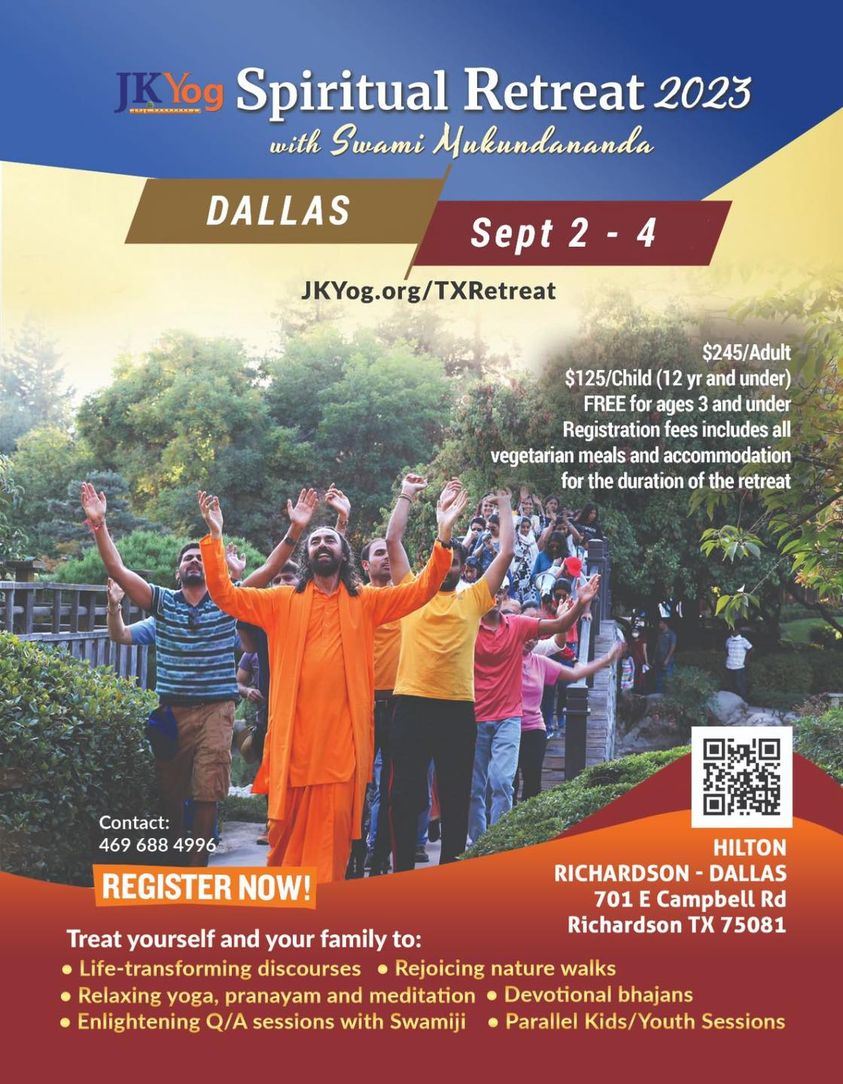
From the Editor’s Desk
No living being can ever be in a state of inaction, not even when asleep. When not engaged in overt physical action, the material mind bound by the three gunas (i.e., sattva, rajas, and tamas), contemplates something at all times. Given that inactivity is impossible, the question that arises is how to engage the body, mind, and intellect synergistically for balancing material and spiritual duties.
In this issue of Samarpan, let us understand the duty of the soul, and for practical purposes, ways to strike a balance in fulfilling both types of duties or dharmas. Let us understand how to apply this Vedic knowledge (i.e., tatvagyan) taught by Swami Mukundananda, the Founder of JKYog, a global organization whose mission is to Transform the World Through Wisdom.

Vedic Wisdom & Application
Challenge of the Month
Balancing Material and Spiritual Duties
Reflection Questions
- What is the Duty of the Soul?
- What is the Difference between Material and Spiritual Duties?
- What is the Outcome of Fulfilling Material vs. Spiritual Duties?
- What is the Source of Confusion Regarding Material and Spiritual Duties?
- How can we Balance Material and Spiritual Duties?
No living being can ever be in a state of inaction either physically or mentally (BG 3.5). When not engaged in overt physical action, the material mind bound by the three gunas (i.e., sattva, rajas, and tamas), contemplates something at all times. Even when asleep, the organs continue to function and the mind remains engaged at the subconscious level. Given that inactivity is impossible, it is better to engage in some action to fulfill one’s duty as opposed to engaging the body and working senses in frivolous pursuits. The question that arises then is whether to engage the body, mind, and intellect in material duties, spiritual duties, or both.
In this issue of Samarpan, let us first understand the duty of the soul. Then we will delve into other aspects that explain the difference between material or spiritual duties, the outcome of each, the source of confusion regarding these duties, and finally ways to find a balance between material and spiritual duties for success in life.
What is the Duty of the Soul?
In the Bhakti Shatak scripture written by Jagadguru Shree Kripaluji Maharaj and narrated by Swamiji at the 2023 Spiritual Retreat & Family Camp, there are six different religions and philosophical schools that have explained the dharma of the soul. The word dharma derives from the root word Dhriya which means something that is worth upholding. How we identify with ourselves determines our dharma. If we identify with the physical body, then the Varnashram (i.e., householder) dharma applies to us. However, if we identify with the soul, then our dharma is to attain God. Additionally, if we identify with the body but possess the knowledge that we are the soul, then too the spiritual dharma applies to us.
What is the Difference between Material and Spiritual Duties?
The Vedic scriptures describe one’s duties as dharma. The English language has no word equivalent to dharma, which constitutes different concepts based on the context. For example, it includes one’s values, principles, attitudes, behaviors, code of ethics/conduct, charity, philanthropy, and karm or actions. However, the rule of dharma changes with time (i.e., period in history), place (i.e., country), varna (i.e., social caste), and stage of life (e.g., Vanaprastashram, etc.). The Vedic scriptures also explain that dharma is created by God and no one, not even a Rishi, is equipped to know its secret unless God enables a soul the power to comprehend its essence.
For our practical purpose, suffice it to say that the various eastern and western philosophies have narrowed down the concept of dharma into two broad categories: Material (pertaining to the body or Apara dharma) and spiritual (pertaining to God or Para dharma). Constitutionally since we are made of matter (i.e., body) and spirit (i.e., soul), both dharmas are incumbent upon us to fulfill.
- Material Dharma: Performing the actions (or karm) to fulfill our duties and responsibilities associated with societal obligations, constitutes material or bodily dharma. For example, taking care of the family, maintaining a profession or career, acquiring formal education, serving society, and similar worldly pursuits. The goal of bodily dharma is to achieve material success, maintain cohesion within the family, and establish financial well-being. It also includes performing religious rituals (i.e., karmkand) in accordance with the scriptures. Such rituals are usually performed with the intent of receiving material boons in return (e.g., wealth, child, good health, etc.) or motivated by keeping miseries at bay (e.g., fear of illness). It is important to keep in mind that even if we manage to fulfill the material dharma flawlessly, it will not enable us to reach God.
-
Spiritual Dharma: The spiritual dharma is opposite in nature. It is founded on the belief that we souls are tiny fragments of the Supreme Lord (i.e., we are the jeeva shakti). We are constitutionally programmed to love and serve God as a part of the whole. If we end up serving others in the material world (e.g., parents, children, bosses, colleagues, etc.), then our relationship with God will not flourish. Thus, the spiritual dharma of the soul is to engage in bhakti (or devotion) and develop selfless love for God. This is the para dharma or the divine duty, which is not bound by the material rules of the Varnashram.
A beautiful example to illustrate this point is how Shree Lakshman fulfilled his spiritual dharma of taking care of his father and family. He accompanied Lord Ram to exile instead of staying back to fulfill his bodily dharma. Fulfilling the higher dharma brings the soul closer to God and increases the probability of attaining Him in the future. Additionally, performing the spiritual dharma absolves a soul of the burden of paying off the five kinds of material debts associated with the bodily dharma, provided the loving devotional service to God is selfless (i.e., nishkam), constant (i.e., nirantar), exclusive (i.e., ananya), personal (i.e., bhav-yukta), and independent of karmkand (i.e., karm-rahit).
What is the Outcome of Fulfilling Material vs. Spiritual Duties?
This is a very important question because knowledge of the outcome will enable each of us to select the path that is beneficial for the soul.
Swamiji has beautifully explained in his lectures that there are people who follow the material duties with perfection but are not engaged in the spiritual dharma (i.e., karmi). Such souls are promoted to the celestial abode when the body perishes. The celestial abode presents all kinds of unimaginable opulence, yet there are some limitations. The celestial abode also falls within the material realm which is temporary in nature. Here, the soul does not find permanent happiness. Besides, given that this is the bhog yoni, the soul cannot earn the merits of engaging in bhakti and therefore, cannot attain God.
Then there are souls who not only neglect the spiritual dharma but also the material dharma (i.e., vikarmi). They break the rules of the sacred scriptures by becoming a slave of the senses and living sinful lives with the sole purpose of experiencing self-pleasure. Such souls are demoted to the hellish abode after the body perishes.
In contrast, there are souls who perform all worldly duties but dedicate all their actions to God in devotional service (i.e., akarmi). They harbor no expectation of any material boon, nor are they averse to any action based on their own intellect. Therefore, such souls do not incur any karmic reaction. This is also called akarma or inaction in action, where the mind has no selfish desires when the body performs an action (e.g., Arjun slays the enemies in the Mahabharat war while offering his actions as a service to the Lord). It is also referred to as action in inaction, where the mind dedicates all actions to God while the body performs the physical motions (e.g., Prahlad announced that his son Virochan be hanged in the same neutral sentiment with which he asked the guards to release him upon the instruction of his Guruputra, Sudhanva). Such souls grounded in karm yog, upon death, transmigrate permanently to God’s divine abode.
Beyond all three is the karm sanyasi who exclusively engages in the spiritual dharma with the mind attached only to God. Such a soul is eligible to neglect the lower bodily dharma in pursuit of the higher spiritual dharma. Being 100% surrendered to God, such souls are not bound by the debts to celestial gods (i.e., Dev rin), ancestors (i.e., Pithri rin), other humans (i.e., Nri rin), all living beings (i.e., Bhoot rin), or saints (i.e., Rishi rin). Such souls also transmigrate permanently to the divine abode of God. However, karm sanyas requires eligibility criteria. Only the divine Guru can determine which souls are qualified to pursue this path.
For the vast majority of us, the recommended path is karm yog, which is living in householder life and doing bhakti to elevate the soul. If a karm yogi strives to attain the goal but is not successful due to an inability to control the turbulent mind, there is no reason to worry. Shree Krishna’s compassionate words offered solace to Arjun: The Lord said:
प्राप्य पुण्यकृतां लोकानुषित्वा शाश्वती: समा: |
शुचीनां श्रीमतां गेहे योगभ्रष्टोऽभिजायते || 41||
अथवा योगिनामेव कुले भवति धीमताम् |
एतद्धि दुर्लभतरं लोके जन्म यदीदृशम् || 42||
prapya punya-kritam lokan ushitva shashvatih samah
shuchinam shrimatam gehe yoga-bhrashto ’bhijayate
atha va yoginam eva kule bhavati dhimatam
etad dhi durlabhataram loke janma yad idrisham
The unsuccessful yogis, upon death, go to the abodes of the virtuous. After dwelling there for many ages, they are again reborn in the earth plane, into a family of pious and prosperous people. Else, if they had developed dispassion due to long practice of Yog, they are born into a family endowed with divine wisdom. Such a birth is very difficult to attain in this world (BG 6.41-6.42)
What is the Source of Confusion Regarding Material and Spiritual Duties?
The outcomes of each type of duty may help to decrease the confusion that people experience regarding their roles and responsibilities. However, people are confused because neglecting material duties almost always has immediate adverse consequences. These are the sources of people’s concerns:
- Societal Conditioning: Our society often places significant emphasis on material success, wealth, and external achievements. This conditioning can create a belief system that prioritizes worldly pursuits, making it challenging for people to prioritize their spiritual growth and fulfillment.
- Competing Priorities: Engaging in material and spiritual duties can be challenging because both require different mindsets and time commitments. To perform both types of duties effectively, the physical focus has to be on the task while keeping the mind neutral. This is an elevated state and extremely difficult for most people.
- Lack of Clarity: Many individuals who do not have a spiritual Guru may not have a clear understanding of how to establish a well-defined path to perform both types of duties in their everyday lives.
- Fear of Judgment: The fear of being negatively judged or ostracized by others can also contribute to reluctance to forge ahead on the spiritual path. It deviates from societal norms and may elicit skepticism or disapproval from family, friends, or the community, mostly rooted in concern regarding the fulfillment of their own personal needs.
- Inner Conflict and Doubts: People may experience inner conflicts and doubts about the efficacy of spiritual practices, the validity of spiritual teachings, or the relevance of spiritual pursuits in their lives. These uncertainties arise due to a lack of true scriptural knowledge or the absence of a true Guru to guide one in knowing the purpose of life, and/or lack of faith in Guru and/or the Scriptures.
- Lack of Personal Experience: Without direct personal experiences or a deep understanding of the benefits and transformative potential of spiritual practices, individuals may struggle to recognize the value and significance of spiritual dharma, leading to confusion or skepticism.
- Attachment to Worldly Desires: The mind’s attachment to worldly desires, material possessions, and external recognition can cloud one's judgment and make it difficult to discern the true importance and value of spiritual dharma.
Given some sources of confusion regarding the pursuit of material and spiritual duties, let us find solutions for how to balance both aspects for a successful life.
How can We Balance Material and Spiritual Duties?
In The Power of Thoughts, Swamiji quoted the Atharva Veda which states that “There are two kinds of knowledge that we must cultivate—material knowledge and spiritual knowledge. The knowers of Brahman have said this” (p. 188). The reference here is to engage in both material and spiritual duties like a karm yogi. Please refer to the September 2022 issue of Samarpan that focuses on understanding and implementing the spiritual dharma of karm yog (Karm Yog – Science of Work). Here, we present some practical strategies to balance both material and spiritual duties.
Balancing material and spiritual duties is a dynamic process that involves integrating both in a harmonious and meaningful way. Here are some practical tips:
- Set Priorities: We can identify our core values and set clear priorities for both material and spiritual aspects of life. Determine what truly matters based on the knowledge of the scriptures, our identity as the soul, and the purpose of life. Then we can allocate time and energy accordingly so both duties are balanced.
- Conscious Time Management: We must create a schedule that allows for dedicated time for both material and spiritual activities. We may set aside specific periods for work, family, and spiritual practices (e.g., prayer, hearing or reading divine knowledge, chanting, meditation, contemplation, and seva or service).
- Integrate Spiritual Practices in the Daily Routine: We must consciously find ways to incorporate spiritual sentiments when going about the daily routine (e.g., doing a job to generate income to serve God; cooking food to offer Bhog to God; taking care of the family because God chose me for this responsibility).
- Practice Gratitude: We must cultivate an attitude of gratitude for both material and spiritual blessings. Accept material responsibilities as a tool to learn detachment from the world! Appreciate the opportunities for inner transformation provided through the spiritual journey under the guidance of a true Guru.
- Practice the Presence of God: Such a practice has the potential to enhance our ability to balance both material and spiritual duties effectively, especially as it also enhances the practice of karm yog (see the October 2021 issue of Samarpan on Learn to Practice the Presence of God).
- Avoid Overcommitment: We should be mindful of taking on too many material duties that leave little time for spiritual pursuits. We can learn to say “No” to unnecessary commitments that please others but take time away from spiritual duties.
- Regular Contemplation: We should make time for self-reflection and contemplation to assess whether there is a healthy balance between material and spiritual duties. We can also contemplate the relative happiness derived from fulfilling each duty.
- Conceal Spiritual Sentiments: The mind’s attachment to God/Guru can be practiced in private – inside the head! When our sentiments are concealed, we can perform material duties while thinking of God/Guru and the strength of their association. Nurturing devotion sentiments internally makes our spiritual aspiration less obvious while going about our duties in the external world.

Tools for Your Personal Growth
We have understood the difference between material and spiritual duties and the need to fulfill each type of duty for a balanced life. Here are some reflective questions to help us to gauge our alignment with both types of duties or dharmas.
Use this tool to assess yourself. A downloadable tracking sheet is available for you to use.

Here are some reflective questions to help gauge our alignment with material and spiritual duties in life. Remember, change takes time!

Love to Hear from You
- How did you apply the Vedic Wisdom?
- What challenges did you experience in the process?
Please share your comments under “Join the Discussion” below.

Gems of Wisdom from Swamiji
Here are a few YouTube video titles with related links and books where Swamiji has explained the material and spiritual dharma.
- The NATURE of our Human Mind | Bhagavad Gita Chapter 3 Verse
- Lord Krishna's Advice - How to Focus on the Present Moment?
- How to Free Yourself from Karmic Reactions | Bhagavad Gita Chapter 3 Verse 9
- Mukundananda, S. (2022). The Power of Thoughts, Penguin Random House: Gurugram, India.
- Mukundananda, S. (2022). Bhagavad Gita – The Song of God, Westland Publications: Chennai, India.



Hold Your Breath! Check out Upcoming Events
We are very excited to share a dynamite event that everyone is looking forward to early next month!

JKYog Dallas Retreat: Celebrate the Power of Knowledge and Enlightenment
A spiritual retreat with Swamiji is the most awaited, life-transforming and blissful of all programs. Hundreds of devotees participate in these retreats to take advantage of the opportunity to “leave the whole world behind” and focus on sadhana. If you yearn for personal time from the demands of work and family to do your sadhana, this is the best opportunity to give yourself the gift of time for your own internal growth.
No one should miss this opportunity. An association with a saint, participation in devotional activities, and opportunities to learn and practice true knowledge is the best way for spiritual growth. In addition, devotees can participate in yoga, pranayam, meditation, kirtans, lectures, parikrama, and other interactive activities. There are parallel activities for youth and Bal-Mukund kids, so participants do not need to worry about childcare or the quality of knowledge disseminated to youngsters.
Registration includes lodging and meals throughout the stay. Once you arrive, there is literally nothing to worry about throughout the duration of the retreat!
When: September 2 to 4, 2023 (Saturday to Monday)
Where: Holiday Inn, 1655 N Central Expy, Richardson, TX 75080
How: In-Person or virtually. Register now if not done already! Time is running out!

Voices from the Global Community
JKYog’s e-Journal Samarpan inspires the community by introducing members to devotees who have been impacted by the scriptural knowledge taught and disseminated by Swamiji. This month, two devotees, Anupama Mullapati and Ritu Murarka, describe what they learned from Swamiji’s teachings regarding material and spiritual duties.


We invite you to share your inspirations and success stories with us at secretary@jkyog.org.

JKYog Transforming Communities
Here, we typically share the amazing activities and news about programs conducted by various JKYog centers in the U.S.
JKYog's Program for Children – Bal-Mukund
Bal-Mukund is a specially designed character-building program, designed and mentored by Swamiji. It focuses on the holistic development of the child and hones their physical, mental, emotional, and spiritual quotient. Multiple Bal-Mukund centers across the US have been imparting quality education and shaping the lives of thousands of children since its inception.
There are six centers that offer this program on a weekly basis. Check out if there is a program in your city.

Glimpses of Past Events
Want a glimpse of some of our events? This month we share beautiful glimpses of the most memorable Spiritual Retreat and Family Camp with Swamiji.








